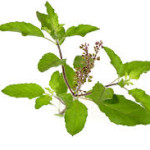 This herb is quiet native to Iran, India and other tropical regions of Asia. Basil grows best under warm, tropical climates. It can also add flavour to food ,in Italy basil is added to many dishes like pesto,pizza soups and more. Basil can also be grown in a pot its fresh leaves and flowers are ready for use whenever you want them. There are different varieties of Basil. Mediterranean” cultivar which is typically known as sweet basil, has light green leaves different to “Asian basil” (Ocinum sanctum) that features large, hairy stems and stalks with pink flowers, purple or red leaves in addition to possessing stronger ‘clove’ like flavour. There is also lemon basil, which has “lemon” flavour. Basil herb contains a good amount of minerals like potassium, copper, and magnesium and many more. Basil leaves are an excellent source of iron and this powerful herb has medicinal values
This herb is quiet native to Iran, India and other tropical regions of Asia. Basil grows best under warm, tropical climates. It can also add flavour to food ,in Italy basil is added to many dishes like pesto,pizza soups and more. Basil can also be grown in a pot its fresh leaves and flowers are ready for use whenever you want them. There are different varieties of Basil. Mediterranean” cultivar which is typically known as sweet basil, has light green leaves different to “Asian basil” (Ocinum sanctum) that features large, hairy stems and stalks with pink flowers, purple or red leaves in addition to possessing stronger ‘clove’ like flavour. There is also lemon basil, which has “lemon” flavour. Basil herb contains a good amount of minerals like potassium, copper, and magnesium and many more. Basil leaves are an excellent source of iron and this powerful herb has medicinal values
Health benefits of Basil
Fever & Common Cold:
During the rainy season, when cold, flu and fever are very common the tender leaves of basil boiled with tea, act as preventive against theses diseases.
Children’s Ailments:
Common problems like cough cold, fever, diarrhea and vomiting respond favourably to the juice of basil leaves. Extract of tulsi(basil)leaves in fresh water should be given every 2 to 3 hours. In between one can keep giving sips of cold water. If pustules of chicken pox delay their appearance, basil leaves taken with saffron will hasten them.
Stress:
Basil leaves are regarded as an anti-stress agent. Recent studies have shown that the leaves afford significant protection against stress. Even healthy persons can chew 12 leaves of basil, twice a day, to prevent stress. It purifies blood and helps prevent several common elements.
Mouth Infections:
The leaves are quit effective for the ulcer and infections in the mouth. A few leaves chewed will cure these conditions.
Above are some of the benefits listed but there are many many more uses of Basil/Tulsi.I believe it is a definite indoor plant.
Coughs:
Tulsi is an important constituent of many Ayurvedic cough syrups and expectorants. . Chewing tulsi leaves relieves cold and flu and help loosen up mucus in bronchitis.
Above are some of the benefits listed but there are many many more uses of Basil/Tulsi
